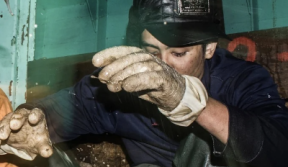Corporations are reaping the benefits of a flexible, global labor system and passing the significant economic and social costs to workers.
We are living in a time of unprecedented mobility. The United Nations estimates that 232 million people, more than 3% of the world’s population, live outside the country of their citizenship. According to the ILO, 120 million of these (most of the working-age population) are migrant workers in their new country of residence. And these numbers only include international migration. Unprecedented numbers of people are moving internally, from rural areas to cities, in search of work. In China alone, there are 262 million such internal migrants, and that number increases by about 4% per year.
A number of economic and demographic factors are pushing these trends. Birth rates have fallen significantly in most developed countries, making it more difficult to fill so-called “3D” (dirty, dangerous, and difficult) jobs in industries such as agriculture, food-processing, manufacturing, and domestic work. Rapid industrialization in some developing countries has also spurred an immediate need for large work forces in areas like construction, natural resource extraction, and domestic work. Countries with large populations and struggling economies have discovered that workers who go abroad to fill these jobs send large amounts of money back to their families, and these remittances have come to make up a significant portion of GDP for a number of countries. It is not only low-skilled labor, however, that is subject to these trends. By 2020, there will be an estimated global shortfall of 85 million workers in high-skilled, technical work, and competition will be high for those workers, wherever they come from.
Unfortunately, protections for migrant workers have not expanded as rapidly as has the demand. Most migrant workers, even many internal migrants, are required to have special documents to legally live and work, and these documents often bind the worker to their employer, making it difficult to change jobs or find a new employer. Most receiving countries have established temporary migrant worker programs, which divide families and saddle workers with the cost of document renewal. Migrant workers frequently work in sectors with weak union representation, and are often barred from organizing unions altogether, weakening their voice on the job. Together, these conditions create significant barriers to migrant workers being able to assert their rights. Workers who speak up may find themselves arrested or deported for doing so.
Migrant workers are often “hired” by recruiters or labor brokers, who often continue to extract payment long after the worker is placed with their employer. These recruiters are rarely regulated and operate complex, global networks in selling labor that can cross the line into selling people into modern-day slavery. In many instances, recruiters use deception, confiscation of travel documents, changes in the terms of contracts, and overwhelming debt at high interest rates to trap workers and continue making money off of them. Workers often pay very high fees to recruiters to find work and must enter their new employment in a form of debt bondage. Meanwhile, employers typically pay nothing to receive the workers, and in some cases are even given free trips for “recruitment fairs” to exotic destinations, all of which is ultimately paid for by the workers themselves.
There are international efforts to improve the situation. The United Nations adopted the International Convention on the Protection of the Rights of All Migrant Workers and Their Families (ICMW) in 1990, and the International Labor Organization has codified two conventions related to migrant workers: No. 97 concerning Migration for Employment and No. 143 concerning Migrations in Abusive Conditions and the Promotion of Equality of Opportunity and Treatment of Migrant Workers. However, these conventions are not widely-ratified and many countries continue to maintain domestic laws that place migrant workers at risk of being exploited by unscrupulous labor brokers or employers.


